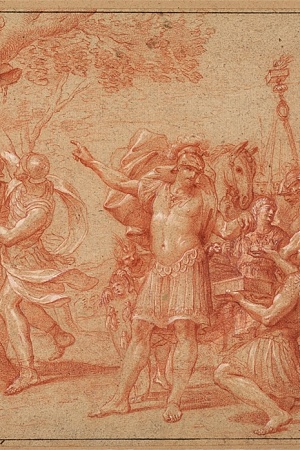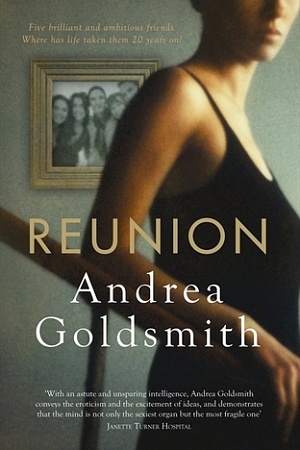'A tribute to Dorothy Porter' by Andrea Goldsmith
I heard the Egypt story countless times, but then Dorothy Porter believed that if a story was worth telling, it warranted multiple retellings. In the late 1980s, before Dot and I met, she visited Egypt to gather material for her verse novel Akhenaten (1992). In Cairo, she joined a tour group taking in the major historical sights. Dot was, by this time, steeped in the life and times of the visionary pharaoh Akhenaten: no matter what was in front of her, her thoughts remained fixed on Akhenaten and his queen, Nefertiti. It was perhaps inevitable that she would suggest the tour group take a detour – a very long detour as it turned out – to see Akhet-Aten, the city built by Akhenaten and greatly loved by him. She promised her fellow travellers an unparalleled treat.
Dot knew that Akhet-Aten had been abandoned at the end of Akhenaten’s reign; she also knew that, while it had long been an important archaeological site, there were no extant buildings. But in her mind, Akhenaten’s city existed – fully formed and filled with life.
The bus travelled for hours through the desert. Dot noticed the legs of a dead donkey ‘sticking out / stiff / in an otherwise / serenely barren desert’, but little else distracted the eye. Finally they reached their destination. Dot, immersed in her own excited imaginings, truly had arrived at Akhet-Aten, but not so the rest of the group. Far from the glittering city Dot had promised, they were confronted with more of Egypt’s abundant desert and another of its many archaeological sites. The heat was sizzling, the wind was wild, sand stuck to their skin, grit caught in their clothes. Dot’s fellow travellers were not happy.
 Dorothy Porter in the Botanical Gardens (photograph by Robert Colvin)
Dorothy Porter in the Botanical Gardens (photograph by Robert Colvin)
Before a riot broke out, Dot stepped forward and gave one of her greatest performances, creating for the group – and for herself – Akhenaten’s beloved city. Out of the archaeological site, she fashioned buildings, gardens, water features, and temples. She created Akhenaten himself, that strangely beguiling figure with the long pointy chin and the thick cushiony mouth. She produced a long-dead Pharaoh and his city from a wildfire imagination fanned by memory and desire. Her fellow travellers returned to the bus satisfied.
Ever since childhood, Dorothy had plunged into her imagination to entertain others. At the age of fourteen, she captivated her schoolmates with a novel in instalments, shaped around a visit to the school by The Beatles. Best of all, she entertained herself with these stories, experiencing the risky and tantalising adventures that eluded her in real life. The imagination’s workings were always mysterious to her, but not the rewards.
Dorothy was an adolescent when first she experienced the ‘supernatural potency of poetry’. She felt as if poetry had found her, chosen her; she could not explain why or how, but she was profoundly grateful. This gift – and she always regarded it as a gift – remained subject to the vulnerability that invariably accompanies unexplained events and experiences. As she reminded herself: The gods give and the gods take away.
Her lifelong poet companions included Shakespeare, Auden, Dickinson, Sappho, Lorca, Akhmatova, Cavafy, and Coleridge. She identified in particular with Rilke, a poet terrified that his imagination would cool down and poetry would desert him, plunging him into the darkest abyss. When Rilke’s lover Lou Andreas-Salomé suggested that he might benefit from psychoanalysis, he refused: he was afraid that if his demons were taken from him, so, too, might be his angels. Dot shared Rilke’s fears and anxieties. She was more likely to consult a fortune-teller than a psychologist. One of her fortune-teller experiences, a complete rip-off in New York City, found its way into her verse novel What a Piece of Work (1999).
Dot was a pagan – with strong Jewish underpinnings (her paternal grandmother was Jewish). Nature was sacred and life-giving. There were libations under our apricot tree for the rewards that came to us, and special prayers offered for friends or family in trouble. Dot valued all living things equally: cats and rhinos, squids and sea hares, snakes and frogs. And birds. She was a dedicated bird watcher, albeit in her own idiosyncratic way: waiting silently and patiently was certainly not Dot’s way. She delighted in the happenstance of birds and drew rich inspiration from them.
 Cover art from Dorothy Porter's Little Hoodlum (1975)
Cover art from Dorothy Porter's Little Hoodlum (1975)
When she was undergoing chemotherapy, every morning a wattle bird appeared beyond the bedroom window, prancing along the balcony rail, noisily showing off. She wrote ‘The Wattle Bird’, a poem sparking with humour and anxiety:
I’m old enough
to be flattered
and take no courting attention
for granted
And when the wattle bird failed to appear:
I sip my strong coffee
and listlessly watch
the window
longing for the joyous noise
of my new, if just
rattling through,
boyfriend.
Her own personal totem was a bird: the raucous, brash, weirdly glamorous sulphur-crested cockatoo. The ancient Egyptians believed that the souls of the dead come back as birds. I welcome every sighting of a sulphur-crested cockatoo.
Dorothy revelled in the white heat of her poetic imagination and was never bored in her own company. Her imagination was always on high alert, so much so that often she did not see what was in front of her. This was extremely convenient when it came to housework, and enormously productive when it concerned poetry. One day, when she was writing The Monkey’s Mask (1994), we went to Melbourne’s Luna Park. Up ahead of us, on the main path, was a big-bottomed woman in bright-pink tracksuit pants. Several months later, Dot wrote ‘Style’.
In love I’ve got no style
my heart is decked out
in bright pink tracksuit pants.
Sometimes, such as in ‘Style’, I could locate the ‘memorymushed images’, but mostly I could not – and Dorothy adamantly did not want to. Like Rilke, she refused to question, she didn’t want to analyse. Don’t tempt the evil eye, as she would say. Just be grateful for what you’ve been given.
People are surprised to learn that it has been ten years since Dorothy Porter died. It doesn’t feel that long, they say. And why should it? Her poems are still being read, her songs are still being played. But there’s something else with the death of this small woman who carved out such a large space, something more.
The most powerful presence
is absence.When the pyramid dissolves
you will keep
its shadow. its deep rich space.
in you.
I look through the glass windows at the back of our house, and I see her, standing on the path by the apricot tree, the strong squat figure, the fine brown hair, those expressive hands wrapped around a glass of white wine, and she’s talking and laughing and talking some more. And then she’s off and away, shooting to the skies like a comet, and, still talking, she zooms into the cosmos and out of sight. Bliss.
Faith
I’ve lived a life
illuminated and
choked
by dreaming
sometimes everything
threads together
in a lightning-charred
tapestry
almost too exciting
to contemplate
let alone live with
other times
have left me
stranded and sobbing
in a muggy black night
of longing
and plain bloody nonsense
but best of all
dreaming
has left a dusting
of memory-mushed images
doesn’t matter
if they can rear at me
like the legs of the frozen
dead donkey
I saw sticking out
stiff
in an otherwise
serenely barren desert
they burn and smelt
this world, this life
into great messy
plundering sense.
Dorothy Porter











Comment (1)
Leave a comment
If you are an ABR subscriber, you will need to sign in to post a comment.
If you have forgotten your sign in details, or if you receive an error message when trying to submit your comment, please email your comment (and the name of the article to which it relates) to ABR Comments. We will review your comment and, subject to approval, we will post it under your name.
Please note that all comments must be approved by ABR and comply with our Terms & Conditions.